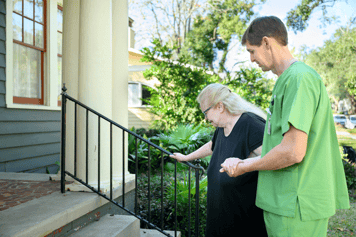Tackling common health challenges involves more than just clinical treatment of underlying medical conditions— it requires understanding the many social and environmental factors that affect a person’s well-being. Across all areas of healthcare, providers must consider how social determinants of health (SDOH) impact patients’ ability to recover, stay healthy and thrive.
Home health plays a critical role in this effort. Clinicians see patients in their real-world environments, where they can directly identify and address these social factors. This makes home health uniquely positioned to support long-term wellness in meaningful and measurable ways.
What Are Social Determinants of Health?
The U.S. Department of Health and Human Services defines SDOH as “The conditions in the environments where people are born, live, learn, work, play, worship, and age that affect a wide range of health, functioning, and quality-of-life outcomes and risks.” 1
These factors— like income level, education, access to nutritious food, and transportation— have a significant impact on health outcomes. Studies show that medical care accounts for only 10-20% of early mortality, while social and environmental factors contribute to the rest. 2 This is why the World Health Organization (WHO) has emphasized the importance of addressing SDOH to improve population health and reduce health inequities. 3
[action 1]
Addressing Social Determinants with Home Health
Because patients experience most of their lives in their communities and homes, home health presents a unique opportunity to directly address SDOH and remove barriers to care.
At its foundation, home health eligibility helps remove barriers to care access. One of the eligibility criteria is being homebound, which the Centers for Medicare and Medicaid Services (CMS) defines as an inability to leave one’s home due to a medical diagnosis, restricted mobility (related to injury or illness) or because it would require “a considerable or taxing effort.”
As part of care delivery at home, home health providers have several tools available to manage SDOH. During a patient’s initial home health visit, clinicians gather data that goes beyond medical needs. They assess:
- Ethnicity and race
- Primary language
- Transportation access
- Health literacy
- Social isolation and support
When barriers are identified, the home health care team can create a plan of care that directly impacts these factors.
.jpg?width=561&height=374&name=Website%20Photos%20(9).jpg)
Promoting Patient and Caregiver Empowerment
A well-equipped, high-quality home health care team contributes to patient and caregiver empowerment in several ways. Patient-centered care strategies allow patients and their families to gain a better knowledge of their diagnosis and encourage them to take part in their own care, providing the resources they need to gain control over their health:
- The home health nurse provides targeted patient and caregiver education alongside clinical care to improve health literacy and self-management.
- The home health social worker can connect patients to community resources and provide emotional support for challenges like transportation, housing, or financial concerns.
- Physical, occupational, and speech therapists, along with home health aides, deliver services that support mobility, safety, and recovery in the home setting.
- Psychiatric nurses help address mental health needs, which are often tied to social and emotional factors.
At Amedisys, we’re committed to providing equitable, high-quality care that meets the real-life needs of our patients. That’s why we’ve developed our Home Health Empowerment Programs – designed to address both medical and social aspects of care. These programs ensure:
- Education, tools and support to manage specific conditions at home
- High-quality in-home health care that is backed by the latest research
- Attention to the many areas of a patient’s life that have been impacted by their health condition(s)
There are four Home Health Empowerment Programs:
With clear visibility into challenges patients face at home, from caregiver burnout to proper medication adherence to economic challenges in managing care, our teams support patients and caregivers in managing complex conditions at home while also helping to reducing the risk of avoidable hospitalizations.
Outcomes of Home Health Empowerment for Patients and Caregivers
Research shows that 80% of health outcomes are influenced by social determinants of health. 4 That means addressing SDOH isn’t optional – it’s essential. Home health provides a critical bridge between medical care and the everyday realities patients face. By helping patients navigate these social and environmental barriers, we can support better health, prevent complications, and promote independent living.
Let’s Partner to Improve Health Outcomes
If you’re looking for a trusted home health provider, Amedisys is here to help. We’ve been providing high-quality home health, hospice and palliative care since 1982. Today we partner with nearly 3,000 hospitals and 110,000 physicians nationwide.
Want to learn more? Fill out our contact form today to find out how we can help you support your patients through whole-person care that addresses social determinants of health.
TeRonna Hall, BSN, RN, CCP, serves as a Clinical Content Development Specialist at Amedisys. With 36 years of healthcare experience, including 34 years in home health, she is dedicated to educating others on health-related topics.





